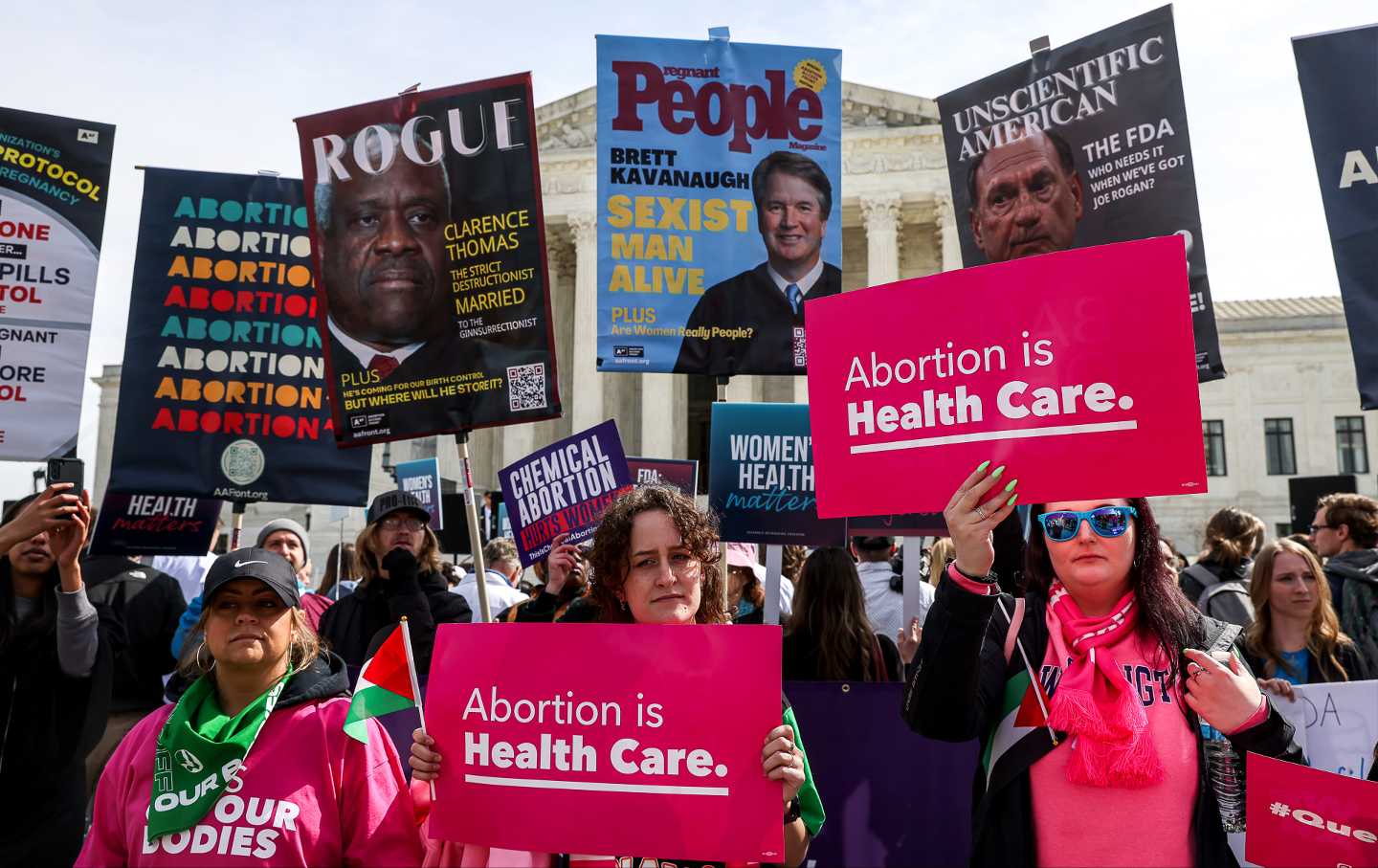The Forced-Birthers Finally Went Too Far Even for This Supreme Court
A majority of the justices seemed highly skeptical of the ridiculous legal case against mifepristone.

Demonstrators outside the US Supreme Court in Washington, D.C., on Tuesday, March 26, 2024.
(Valerie Plesch / Bloomberg via Getty Images)There are a series of big lies at the heart of the conservative push to ban mifepristone, one of the two key drugs used to induce a medical abortion. The first lie is that pregnant people who take the pill are injured by this drug, which was approved by the FDA more than two decades ago, but they just don’t know it. The second lie is that doctors who neither perform abortions nor prescribe the pill are harmed when other people take the medication. And the third lie is that people who are neither doctors nor patients are harmed when they are deprived of the aesthetic benefit of seeing pregnant people out in the wild.
The case against mifepristone has gotten all the way to the Supreme Court based on these lies. On Tuesday, the unscientific absurdity of that case was exposed, and—even though the court’s conservative supermajority hates abortion, women, and the idea that pregnant people have a right to their own bodies—those lies found little purchase in front of the justices. It would seem that the forced-birthers’ weird obsession with other people’s wombs will finally be made to confront at least a sliver of reality.
The case is called FDA v. Alliance for Hippocratic Medicine. The FDA initially approved mifepristone (which had long been approved in parts of Europe) in 2000. Then, in 2016 and 2021, the FDA passed additional regulations expanding how the drug could be distributed; one of those ways was by mail. In 2023, Texas District Court judge Matthew Kacsmaryk, a Trump-appointed zealot who thinks The Handmaid’s Tale is a blueprint and not a warning, revoked the FDA’s approval of the drug and issued a nationwide injunction banning the pill.
That ruling was quickly suspended by the Supreme Court, and Kacsmaryk’s challenge to the 2000 FDA approval was eventually thrown out by the US Court of Appeals for the Fifth Circuit. But a case against the 2016 and 2021 updates—the ones making it easier for providers to prescribe and ship mifepristone—survived and was nominally the issue at play in front of the Supreme Court on Tuesday.
I say “nominally,” because, to reach the question of whether the FDA’s easing of prescription regulations was lawful, the justices first had to address the threshold issue of “standing”—that is, the question of who, if anybody, has the right to challenge the FDA rules in the first place. Traditionally, to have a right to sue the government, you have to show that the government did something to hurt you. Conservatives who want to deny pregnant people access to mifepristone have a big problem when it comes to standing, because they cannot show that anybody was, is, or could be harmed by the FDA’s rules.
The problem is evident right in the title of the case. “Alliance for Hippocratic Medicine” is not a group of pregnant people (or formerly pregnant people) who suffered injuries from taking mifepristone. It’s not a group of doctors who prescribed the drug and now say they were misled by the FDA about its effects. And (I have to bring this up just because of how the conservative brain works) it’s not a group of former fetuses who have returned to the physical plane to haunt the FDA over its drug approval process. Nor is it a group of mediums who have been in seance with the unborn and can represent their concerns.
No, Alliance for Hippocratic Medicine is a mishmash of anti-abortion doctors, nurses, and dentists (yes, dentists) who, though none of them have ever prescribed the pill, claim that they have been harmed by its existence. Their theories of standing range from comical to inept to offensive to contemptible. They include arguments such as:
- Doctors who do not perform abortions are harmed when they have to work in the emergency room when alleged complications from the abortion pill arise.
- Obstetricians who do not perform abortions are harmed because they feel complicit in the abortions that take place, even if they are not a part of those procedures.
- Medical staff are harmed via complicity also.
- Random people who do not perform abortions nonetheless suffer the “aesthetic injury” of being deprived of seeing pregnant people jiggle around with sore backs (I’m not making this theory up—this is what Fifth Circuit Judge James Ho wrote when upholding the ban on mifepristone).
The Supreme Court listened to each of these standing arguments, but I did not hear five votes to support any of them. The conservatives are very often willing to invent injuries and facts in order to grant standing in a case that promises to get them to the outcome they desire (as they did last summer in 303 Creative, through which they resurrected Jim Crow–style laws against the LGBTQ community). But on Tuesday, they balked.
Three women took the job of arguing this case in front of the Supreme Court (a fact that is somehow still rare, despite this being 2024): Solicitor General Elizabeth Prelogar on behalf of the government and the FDA, Jessica Ellsworth on behalf of Danco Laboratories (makers of mifepristone), and Erin Hawley arguing for Alliance for Hippocratic Medicine.
Hawley, a former clerk to Chief Justice John Roberts who happens to be the wife of US Senator Josh Hawley, is a big deal in forced-birth circles; her work has been critical in lurching the country toward the anti-abortion extremism of the far right. But Hawley had a rough day at work.
The four women on the Supreme Court, including noted fetus-protection aficionado Amy Coney Barrett, simply weren’t going for her standing arguments. I felt like I could hear the internal torment in Barrett’s questions: She desperately wanted to rule against the abortion pill and the FDA’s regulations on the merits, but she couldn’t get comfortable with the standing issue. She couldn’t find the aggrieved party. The government had made clear that no doctors who didn’t want to perform abortions would be forced to provide the medicine, and she struggled to get around that. While Barrett was clearly sympathetic to the completely debunked junk science Hawley was using to argue that pregnant people who take the abortion pill suffer, she was kind of stuck, since none of the pregnant people who were allegedly harmed were suing in this case.
As Hawley struggled, Solicitor General Prelogar was resplendent. Justice Samuel Alito was (of course) the most interested in granting standing because he just wants to get this pill off the market, but Prelogar wouldn’t give him an inch.
At one point, Alito complained that under the government’s theory no one would have standing to challenge the FDA, but Prelogar was not put off by that claim. She said, “Even if there is no alternative person to sue, that doesn’t mean the court should abandon its Article Three principles.” Translation: The federal judiciary cannot invent a right to sue just because it doesn’t like the outcome of an executive decision—so you can sit on it, Sammy.
Prelogar then offered the most practically obvious point: If mifepristone really were a dangerous drug, the FDA, and especially Danco Labs, would have been sued in product liability litigation a hundred times over. She didn’t mention Purdue Pharma, makers of OxyContin, by name, but the implication was that Alito should consult with the Sackler family if he’s really unclear about how to get a dangerous drug off the market.
Prelogar was backed by the liberal justices, especially Ketanji Brown Jackson, who was in fine form. At one point, Alito caustically asked Ellsworth, the Danco lawyer, “Do you think the FDA is infallible?” It was a largely rhetorical question. Jackson waited her turn and, about 10 minutes later, she countered with her own question to Ellsworth: “So you were asked if the agency is infallible and I guess I’m wondering about the flip side, which is, do you think that courts have specialized scientific knowledge with respect to pharmaceuticals.… do you have concerns about judges parsing medical and scientific studies?”
When Hawley attempted to argue that medical staff who feel “complicit” should have standing, Jackson queried: “Complicit like I—I work in the emergency room and this is going on? I’m handing them a water bottle?” It makes me happy knowing Justice Jackson is there to make Alito’s life as miserable as possible.
The women on the Supreme Court, including Barrett, do not have the numbers to turn back these ridiculous standing arguments alone, but a couple of the conservative men were also unimpressed with Hawley’s claims. Alleged attempted rapist Brett Kavanaugh asked only one question, which was whether doctors could be forced to perform abortions. Prelogar gave him the obvious answer, “no,” and then Kavanaugh shut up (or passed out again or went back to drafting his fantasy baseball team… I can’t know, the Supreme Court only streams the audio of these hearings). Chief Justice Roberts similarly asked a couple of minor questions but let most of the arguments proceed without comment.
And then there was Justice Neil Gorsuch. He addressed the “aesthetic injury” argument (which is sometimes called “offended observer standing”) head-on. As I’ve explained elsewhere, this type of standing is kind of a thing, but it’s only been applied in environmental cases. It’s a theory that allows environmentalists to sue polluters or developers who are harming the earth and depriving people of the “aesthetic” beauty of the natural world. The problem is that pregnant people, with their round, magical bellies, are not analogous to redwoods or manatees or rock formations or whatever the hell else Alliance for Hippocratic Medicine is trying to reduce them to.
Gorsuch, who is no fan of environmental regulations, kind of hates this type of standing. He brought it up during oral arguments mostly to dismiss it, and he actually chimed in to echo some of Justice Jackson’s questions. I don’t think Gorsuch will go for these standing arguments, if for no other reason than he wants to play the long game here and deny standing in other, more meritorious cases down the road.
At the risk of indulging in hope, it sounded to me like the Supreme Court will dismiss the mifepristone challenge for lack of standing by a vote of 8-1, or maybe 7-2. (Justice Clarence Thomas largely ignored the standing issue and focused on the merits of overruling the FDA’s expanded rules, which means either that he’s made up his mind that he doesn’t care about standing or that he does but also wants to set up a future attack on not only the abortion pill but also the birth control pill.)
Still, even if this challenge is defeated, it never should have gotten this far. Forced-birthers have lied all the way to the Supreme Court, and if they are repulsed now, their takeaway at the end will nonetheless be to keep pushing cockamamie legal theories, because next time it might work. Erin Hawley will not learn a lesson, and the conservatives will not be chastened. They’ve already overturned Roe v. Wade; they will keep working to restrict access to medical abortions, and they’ll be coming for contraception next.
Yesterday’s argument is what passes as a “victory” these days for liberals in front of the Supreme Court. The court never helps, but yesterday it seemed inclined to do no harm. Too bad the justices won’t swear an oath to that principle and vow to restrain themselves the next time Republicans ask them to take something away.
Disobey authoritarians, support The Nation
Over the past year you’ve read Nation writers like Elie Mystal, Kaveh Akbar, John Nichols, Joan Walsh, Bryce Covert, Dave Zirin, Jeet Heer, Michael T. Klare, Katha Pollitt, Amy Littlefield, Gregg Gonsalves, and Sasha Abramsky take on the Trump family’s corruption, set the record straight about Robert F. Kennedy Jr.’s catastrophic Make America Healthy Again movement, survey the fallout and human cost of the DOGE wrecking ball, anticipate the Supreme Court’s dangerous antidemocratic rulings, and amplify successful tactics of resistance on the streets and in Congress.
We publish these stories because when members of our communities are being abducted, household debt is climbing, and AI data centers are causing water and electricity shortages, we have a duty as journalists to do all we can to inform the public.
In 2026, our aim is to do more than ever before—but we need your support to make that happen.
Through December 31, a generous donor will match all donations up to $75,000. That means that your contribution will be doubled, dollar for dollar. If we hit the full match, we’ll be starting 2026 with $150,000 to invest in the stories that impact real people’s lives—the kinds of stories that billionaire-owned, corporate-backed outlets aren’t covering.
With your support, our team will publish major stories that the president and his allies won’t want you to read. We’ll cover the emerging military-tech industrial complex and matters of war, peace, and surveillance, as well as the affordability crisis, hunger, housing, healthcare, the environment, attacks on reproductive rights, and much more. At the same time, we’ll imagine alternatives to Trumpian rule and uplift efforts to create a better world, here and now.
While your gift has twice the impact, I’m asking you to support The Nation with a donation today. You’ll empower the journalists, editors, and fact-checkers best equipped to hold this authoritarian administration to account.
I hope you won’t miss this moment—donate to The Nation today.
Onward,
Katrina vanden Heuvel
Editor and publisher, The Nation
More from The Nation

The Longest Journey Is Over The Longest Journey Is Over
With the death of Norman Podhoretz at 95, the transition from New York’s intellectual golden age to the age of grievance and provocation is complete.

The Epstein Survivors Are Demanding Accountability Now The Epstein Survivors Are Demanding Accountability Now
The passage of the Epstein Files Transparency Act is a big step—but its champions are keeping the pressure on.

The Fight to Keep New Orleans From Becoming “Everywhere Else” The Fight to Keep New Orleans From Becoming “Everywhere Else”
Twenty years after Katrina, the cultural workers who kept New Orleans alive are demanding not to be pushed aside.

Breaking the LAPD’s Choke Hold Breaking the LAPD’s Choke Hold
How the late-20th-century battles over race and policing in Los Angeles foreshadowed the Trump era.

Mayor of LA to America: “Beware!” Mayor of LA to America: “Beware!”
Trump has made Los Angeles a testing ground for military intervention on our streets. Mayor Karen Bass says her city has become an example for how to fight back.

Organized Labor at a Crossroads Organized Labor at a Crossroads
How can unions adapt to a new landscape of work?


